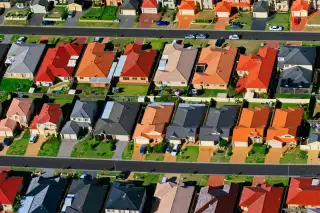A Key Indicator Suggests Mortgage Rates' Epic Decline May Soon End

Homebuyers and refinancers looking for the best possible price might want to consider locking in their mortgage rate now. Though rates started the year with a new record low, a key benchmark suggests home loans could soon start getting more expensive.
Last week, the yield on the 10-year Treasury note crossed above 1% for the first time in 10 months, as the recent Democratic victories in Georgia raised the chances of more stimulus, which could mean faster economic growth, but also lead to inflation.
By Friday the Treasury note yield was 1.13%. Typically, mortgage rates move in lockstep with Treasury yields, leading some experts to predict rates will soon rise.
“Given that mortgage rates usually track with the 10-year Treasury note, we should closely follow the trend of the 10-year yield,” wrote Nadia Evangelou, a research economist for the National Association of Realtors on Thursday.
She noted that current Treasury yields imply rates could rise in 2021 and that NAR forecasts show the 10-year yield averaging 1.1% this year with mortgage rates at 3.1%.
Why Bond Yields Matter to Mortgage Borrowers
In March, as the coronavirus pandemic started spreading in the United States, investors flocked to safe assets like Treasury notes, and quickly bid up these bonds’ prices. That month, the 10-year yield dropped below 1% for the first time ever and quickly fell to a record low of 0.38%. Bond yields rise when bond prices fall.
Yields have been drifting higher for months. However, the move above 1% Tuesday night, as vote tallies came in from Georgia, was swift. There is no magic at 1%, it is a psychological threshold like when the Dow Jones Industrial Average crossed 30,000. However, the pace of increases has caught some on Wall Street off-guard.
The prospect of additional spending means the government will be borrowing more, issuing more bonds and increasing the supply in the market. Meanwhile, faster economic growth could increase inflation.
Lenders — including both bond investors and companies that issue mortgages — price expected future inflation into interest rates. Otherwise, they risk being paid back with dollars that are less valuable than the ones they lent out.
The 30-year mortgage rate usually tracks the 10-year Treasury yield because most homeowners move or refinance within a decade. That means investors who buy loans today will likely get paid back around the same time as 10-year Treasury holders and want to be paid slightly more because they are taking on additional risk, like the risk homeowners will fail to pay.
How Rising Rates Could Cost Mortgage Borrowers
Normally, there is a spread of about 1.8 percentage points between the 10-year Treasury and mortgage rates. So if the 10-year Treasury yield is at 1%, experts would expect mortgage rates to settle at about 2.8% sooner or later.
The latest data from mortgage investor Freddie Mac’s shows that in the first week of 2021 the rates offered to the most qualified borrowers hit a record low of 2.65%.
Money’s own daily survey of lenders shows that a more typical borrower got an average offer of 3.102% for a 30-year mortgage on Friday after starting the week at 2.973%.
“More government spending could lead to moderate mortgage-rate increases,” noted Daryl Fairweather, chief economist at real estate brokerage Redfin. However, she pointed out that the new Congress is also more likely to favor programs that make homeownership more affordable.
To be sure, the usual relationship did not hold in 2020. For example, when mortgage rates sank below 3% for the first time in July the 10-year Treasury was around 0.6%. Although mortgage rates hit 16 record lows in 2020, by this metric they should have been even lower.
Last week’s “swift increase in rates was a wakeup call, but the path forward for mortgage rates remains uncertain and largely dependent on the economy’s ability to improve,” wrote Matthew Speakman, a Zillow economist on Wednesday.
More from Money:
Money's 2021 Real Estate Outlook: What to Expect for Mortgage Rates, Home Prices and More
2021 Real Estate Predictions: How Vaccines, President Biden and More Could Shape Housing Trend